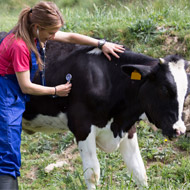
Strong possibility disease could hit the UK this summer
With the expected arrival of Bluetongue from France this summer, the National Sheep Association are urging vaccine manufacturers to restart production.
A recent report published by the Animal Plant and Health Agency showed there was an 80 per cent chance of the bluetongue virus serotype 8 (BTV8) hitting UK shores later this year.
In a statement released last Wednesday (30 March), the NSA say that they are working hard to keep the need for an agreed disease control strategy ‘at the top of the agenda.’
According to the NSA, the French Government currently owns all existing vaccine for BTV8 and has made it compulsory for any stock exiting the restriction zone in France to comply with pre-movement vaccination stipulations. There is currently no vaccine available in the UK.
“The NSA position, which is shared by the Sheep Veterinary Society, is that we must do all we can to keep the UK clear of the virus and not allow it to become endemic if it does arrive," said NSA chief executive Phil Stocker.
“We should treat any opinion that this is a ‘low impact’ disease with extreme caution, as while there may be some residual immunity in France, we do not believe that is the case here. The UK remains highly vulnerable, with a potential BTV8 outbreak posing real welfare and production problems.
“Many NSA members tell me that, if a vaccine was available at a reasonable cost, they would choose to use it. Whether that would get usage to a level that would protect the national flock is questionable, but that is where we are at the moment and the most important challenge is to get adequate approved and inactive vaccine stocks available at a price that encourages uptake.”
So far the NSA understands the majority of confirmed cases in France have been picked up through surveillance rather than clinical signs. Experts suggest that circulation is presently limited due to unstable weather conditions and/or a degree of residual immunity being present.
“Given that the UK is an island nation and we have the potential to protect ourselves through vaccination in advance of any spread to our shores, planning for adequate vaccine production and uptake is now essential,” continued Mr. Stocker.
“I urge producers in potentially vulnerable areas to seriously think about how an outbreak of bluetongue could impact on their own stock and their ability to move stock, and to consider committing to a vaccination programme. I also urge vaccine manufacturers to step up their communication with the UK livestock industry and to start preparing the way for manufacture.”



 The latest
The latest